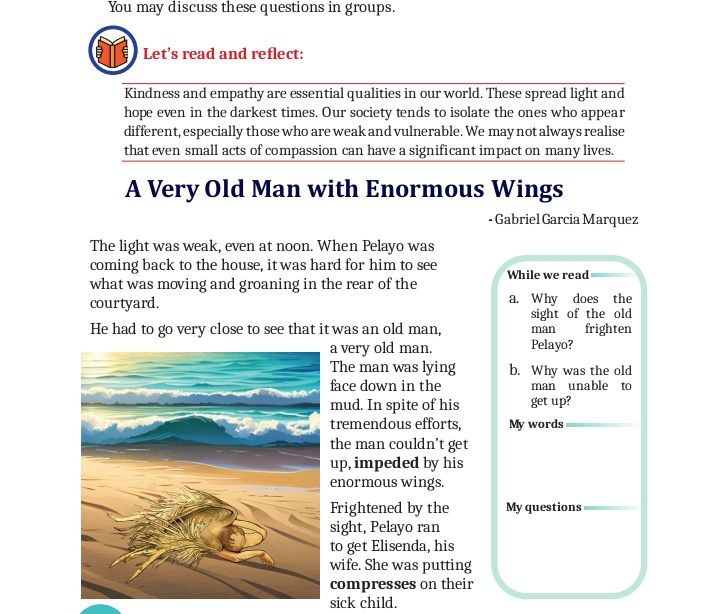Quest For A Theory Of Everything
Quest For A Theory Of Everything
- Kitty Gail Ferguson
Textual Questions:
• How did Hawking startle the audience?
Hawking startle the audience by saying that there was an end in sight for Theoretical Physics. He invited them to join him in a sensational escape through time and space.
• Stephen Hawking did not appear to be a promising choice to lead any adventure. Why?
Stephen Hawking was sitting in a wheelchair while one of his students was reading his lecture to the audience. His appearance was not healthy. He did not appear to be a promising choice to lead any adventure.
• Can a person be judged by appearance alone? Justify your response.
A person can't be judged by appearance alone. Many great men in history did not have a great appearance. Napoleon Bonaparte was a very short person. Franklin Roosevelt, one of the greatest American presidents, spent most of his working hours in a wheelchair, and he walked with leg braces and canes, usually with help. Mother Theresa did not appear a robust person but she was really great.
• What do you learn about Stephen Hawking's childhood?
Stephen Hawking was born on 8 January 1942 in Oxford, England. His parents were Frank and Isobel Hawking. They were not wealthy. Hawking attented the local St. Alban's school. By the time he was 8, he was seriously thinking of becoming a scientist. His father wanted him to study medicine. But Stephen thought biology was too imprecise. He wanted a subject in which he could look for exact answers. He was just an ordinary school boy. He was slow in learning to read and his handwriting was horrible. At 14, Stephen knew he would study Maths and physics. But his father discouraged him from studying maths because he thought it offered no jobs, except teaching. Stephen's father wanted him to attend Oxford where he had studied. Oxford had no Mathematics. So stephen studied chemistry and physics and only a little mathematics. At the age of 17, Hawking went to Oxford to study natural science and to specialise in physics.
• Comment on Hawking's life at Oxford?
For about one year and half, Hawking was lonely and bored at Oxford. He also did not try hard at his academics. But half way through the second year, he began to enjoy Oxford.
• What opinion did Stephen's peers at Oxford have about him?
Hawking became popular and was well-accepted among his peers. They remember him as lively, buoyant and adaptable. He wore his hair long. He was famous for his wit. He liked classical music and science fiction. He took part in sports.
• Cite an example to prove that Stephen Hawking was sharp witted. Did his wit help him in any way?
Stephen Hawking had applied to do Ph.D at cambridge while he was a student at Oxford. He was accepted on condition that he got a 'First' from Oxford. Hawking thought he could get through successfully. But as the examination came, his confidence failed. Hawking got only a borderline result between a first and a second. As he had only a borderline result, his exaniners called him for an interview and asked him about his plans. He told the examiners boldly, "If I get a first, I shall go to Cambridge. If I receive a second, I will remain at Oxford. So I expect that you will give me a first". He got his 'first' and he went to cambridge. His wit helped him here to get what he wanted.
• Stephen's first year at Cambridge was worse than that at Oxford. Why?
His first year ar Cambridge was worse than that at oxford. His poor mathematical background troubled him. He found general relativity is extremely tough. There was even a bigger problem. During his third year, he had started getting a bit careless. He had fallen once or twice for no apparent reason. Soon he had trouble tying his shoes and sometimes he had difficulty in talking.
• How did tragedy strike Hawking after his twenty first birthday?
Shortly after his twenty first birthday, in 1963, tragedy struck him. He contracted a rare disease, amyotrophic lateral sclerosis, for which there was no known cure. It caused a gradual disintegration of the nerve cells in the spinal cord and the brain. He went into a deep depression. He did not know what to do and what his future would be.
• What drastic change came over Hawking after the diagnosis of the disease?
A drastic change came over Hawking after the diagnosis of the disease. He had many dreams. He said that his dreams were at that time very confused. Before his condition was diagnosed he was bored with life. But after he came out of the hospital, he dreamt that he was going to be executed. He realized then that there were a lot of important things to do if he was given a reprieve - time to live for some more time. Hawking was getting some more time to live and life was precious.
• what was Jane's imoression of Hawking?
Just before Hawking entered the hospital for tests, he met Jane Wilde at a New Year's Party at St. Alban's. She thought Hawking was very intelligent, eccentric and rather arrogant. But he was interesting and she liked his wit. She fell in love with him.
• Write a note on the character of Jane.
Jane was a shy teenager with a strong faith in God. This faith was ingrained from childhood by hwr mother.
She believed that good can come out of any adversity. When she met Hawking after his discharge from the hospital, he was in a sad state. She felt that he had lost his will to live and he was very confused. She was not put off by his physical or mental condition. Hawking liked her optimism and their friendship grew. They thought that together they could make something good.
• Is Stephen Hawking really a great mind on par with the likes of Einstein and Newton? Justify your answer?
It is not yet time to make a verdict on the work of Stephen Hawking. Newton and Einstein are giants who rule the world science. It is true that Hawking has said some significant things about the universe. He has asked significant questions but he has not provided adequate answers. Anybody can ask questions. Asking questions does not make a person genius. Hawking used to ask daring, unexpected and penetrating questions during the sessions involving some of the most famous and distinguished scientists in the world. That is how he earned his name as 'a genius' and as 'another Einstein'. I don't think his mind is on par with the likes of Newton and Einstein.
• List the interesting facts dealt with in Hawking's book.
The interesting facts in Hawking's book are - where did the universe come from? Is it infinite? Does it have any boundaries? Will it come to an end? If so, how? Is there a complete theory of universe and everyrhing in it? Is there a beginning of time? Could time run back? The book begins by recounting the great theories of the cosmos from Newton to Einstein. His purpose in writing the book was to make science understandable to non - scientists.
• What could have been the misgivings of Jane?
While on a trip to Switzerland, Hawking contracted pneumonia and was left on a life support system. The doctors treating him suggested a tracheotomy operation which would remive his wind pipe. It might save his life but he would never again be able to speak or make a vocal sound. Jane thought her husband might die with this operation. That is why she said, 'The future looks very bleak'. Hawking would no longer breathe through his mouth and nose, but through a permanent hole made in his throat.
• How could he overcome his difficulties after the tracheotomy operation?
Since Hawking could not speak, Walt Woltosz, a computer expert in California, sent him a program he had devoloped. It was called the Equalizer. It would allow Hawking to select words from the screen and this way he could continue to do his work, although very slowly.
• Mention some of the unique ideas and paradoxes putforward by Stephen Hawking.
Some of the unique ideas and paradoxes putforward by Stephen Hawking are - In science and with people, things are often not what they seem. Pieces that ought to fit together refuse to do so You will learn that beginnings may be endings.Cruel circumstances can lead to happiness, although fame and succes may not. Two great scientific theories taken together seem to give us nonsense. Empty spaces is not empty. Black holes are not black.
• What was Hawking's attitude to his disability? How do you estimate it in a wider social context?
Hawking chose to ignore his difficulty. He expected others to adopt the same attitude. In the modern days we call 'disabled' people as 'Differently Abled People'. A physical disability does not have to make you desoerate and a victim of sympathy. Franklin Roosevelt, one of the most famous American Presidents spent most of his working hours in a wheelchair and walked with leg braces and a cane, supported by others. Helen Keller - blind, deaf and dumb - became world famous because of her detdrmination to succeed and she did. Handicaps need not be looked upon as excuses to be lazy. With hardwork one can overcome his handicaps.



Comments
Post a Comment
Please share your feedback and questions